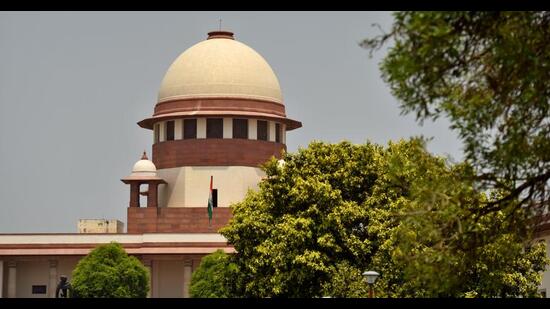Jul 31, 2024 04:40 PM IST
The Supreme Court said that convicts undergoing life imprisonment have a right to premature release but society also has a right to live peacefully
The Supreme Court on Wednesday refused an urgent hearing of the gangster-turned-politician Arun Gulab Gawli’s parole application, saying convicts undergoing life imprisonment have a right to premature release but society also has a right to live peacefully. Gawli has been serving life imprisonment for the 2007 murder of Shiv Sena corporator Kamlakar Jamsandekar.

A bench of justices Surya Kant and Dipankar Datta said that they are conscious of the rights of prisoners and have granted indulgence in the past. “We would not be able to grant you any interim relief. As your matter requires in-depth consideration, we would like to decide the appeal itself. We cannot be unfair to you and we cannot be unfair to the state as well.”
Senior advocate Nitya Ramakrishnan, who appeared for Gawli, said that her client is 72 and has been released 15 times on parole. She added Gawli suffered from a severe breathing disorder. “For a moment keep aside Gawli. Let this court not be driven by this case. There is a 2006 remission policy which provides relief to prisoners aged over 65 who have completed 14 years of imprisonment.”
The bench called for the need to be conscious of the factual situation. “That old movie ‘Sholay’ reminds us of the famous dialogue – Gabbar aa jayega [Gabbar will come]. Everybody knows Arun Gawli.”
Senior advocate Raja Thakre, who represented Maharashtra, pointed out Gawli faces 46 cases. He added Gawli was convicted and sentenced to life imprisonment in 2012 under the Maharashtra Control of Organised Crime Act (MCOCA). Thakre said MCOCA convicts are governed by a 2010 policy, which requires a convict to undergo 40-year imprisonment to be considered for premature release.
The court asked Thakre whether Gawli committed any offence in the recent past considering the cases against date back to an earlier point in time. Thakre said Gawli has a propensity to commit crimes. “As head of the crime syndicate, his name is sufficient in Maharashtra for builders to fear as he operates an extortion racket.”
The court asked how would society know if he had reformed or not. “You may have your agencies to find out if he is still active in crime,” the bench said.
The Bombay high court’s Nagpur bench rejected the state’s objections while ordering Gawli’s premature release, citing the 2006 policy. The order came even as the state submitted that the revised remission guidelines issued in 2015 exclude MCOCA convicts. The state said that Gawli turned 65 in 2018 and was ineligible for remission even under the 2006 policy.
On Wednesday, the issue was again argued before the Supreme Court. Gawli’s legal team pointed out that the Code of Criminal Procedure Section 432 allowed the state to pass a special order in the case of old and infirm prisoners.
The Supreme Court noted that even then a convict should have undergone half of the substantive sentence. It said this will be governed by the 2010 policy in the context of MCOCA, requiring convicts to undergo a minimum 40-year imprisonment to be considered for remission. “There is a lot of interplay between policies, rules, and orders. We need to sit and resolve it. We would like to decide the appeal itself,” the bench said.
Gawli, the Akhil Bharatiya Sena founder who represented Chinchpokli in the Maharashtra assembly (2004-2009), cited his old age and report a Medical Board to suggest he suffered from Compulsory Obstructive Pulmonary Disorder (COPD) and needed regular attention.
The court said his mental faculties were working well and there was no physical disability. “As regards COPD, it can be stabilised with antibiotics.” The court agreed to consider the legal question when the matter is next heard in November.
The Supreme Court was hearing Maharashtra’s appeal against the high court’s April 5 order granting Gawli premature release. Gawli separately applied for a 15-day parole. The Supreme Court extended its order granting the stay on the high court order.


